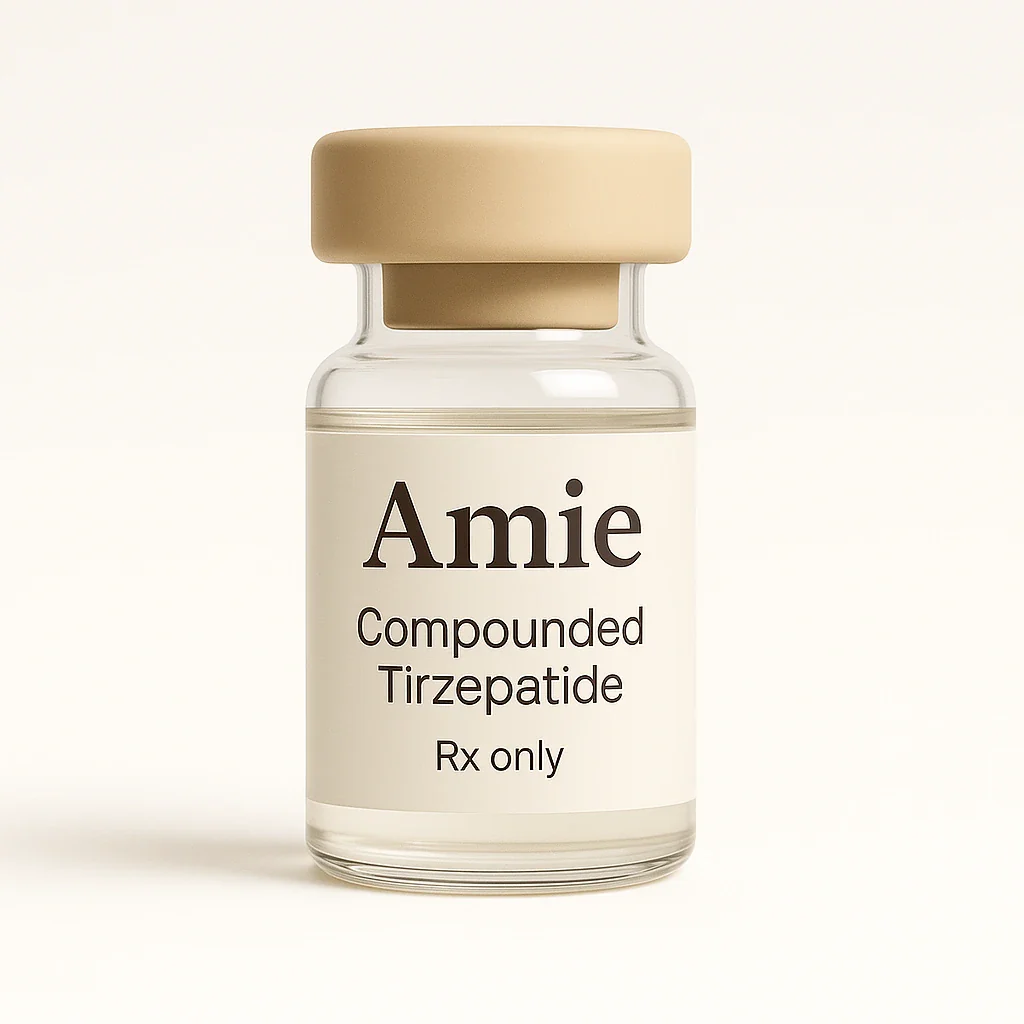Pituitary Gland Disorders and Weight Gain

The pituitary gland, a small organ at the base of your brain, controls hormones like growth hormone (GH), thyroid-stimulating hormone (TSH), and adrenocorticotropic hormone (ACTH). These hormones regulate metabolism, energy use, and fat distribution. When imbalanced, they can lead to weight gain that’s hard to manage.
Key Causes of Pituitary-Related Weight Gain:
- Cushing’s Disease: High cortisol levels cause fat buildup in the midsection, face, and upper back.
- Hypopituitarism: Low hormone levels slow metabolism, increase body fat, and reduce muscle mass.
- Prolactinomas: Tumors that disrupt appetite and hormonal balance, causing weight gain.
Treatment Options:
- Hormone Replacement Therapy (HRT): Restores balance for hormones like GH, TSH, and cortisol.
- Medications: Options like Compounded Semaglutide and Tirzepatide help reduce appetite and improve metabolism.
- Lifestyle Adjustments: Tailored diet and exercise plans enhance medical treatments.
- Surgery: For severe cases, removing pituitary tumors may be necessary.
Quick Comparison of Treatments:
| Treatment Type | Purpose | Example Options |
|---|---|---|
| Hormone Replacement | Restores hormonal balance | Synthetic T4, GH injections |
| Weight Loss Medications | Reduces appetite, improves metabolism | Compounded Semaglutide, Tirzepatide |
| Lifestyle Adjustments | Supports overall weight loss | Protein-rich diets, resistance training |
| Surgery | Removes pituitary tumors | Transsphenoidal surgery |
Addressing hormonal imbalances early is crucial. Combining medical care, medications, and lifestyle changes can lead to significant weight loss and improved health. For example, patients using Amie's telehealth services have reported losing up to 20% of their body weight within a year.
Want to learn more about managing weight gain caused by pituitary disorders? Keep reading for detailed insights and real-life success stories.
Cushing Disease & ACTH-Secreting Pituitary Tumors – Mayo ...
Common Pituitary Disorders That Cause Weight Gain
Some pituitary disorders can interfere with metabolism, leading to specific patterns of weight gain. Below are examples of how hormonal imbalances from these conditions affect body weight.
Cushing's Disease Effects
Cushing's disease happens when the pituitary gland produces too much ACTH, which raises cortisol levels. This hormonal shift often causes:
- Fat accumulation around the midsection
- A round, full face (commonly called "moon face")
- A fat deposit on the upper back (referred to as a "buffalo hump")
- Thin arms and legs
Traditional diet and exercise often struggle to counter these cortisol-related changes. Spotting these patterns is key to determining the right treatment approach.
Hypopituitarism Impact
Hypopituitarism reduces the production of one or more pituitary hormones, affecting metabolism in various ways:
| Hormone Deficiency | Effect on Weight | Other Symptoms |
|---|---|---|
| Growth Hormone | Higher body fat | Loss of muscle mass |
| TSH (Thyroid-Stimulating Hormone) | Slower metabolism | Fatigue, sensitivity to cold |
| ACTH (Adrenocorticotropic Hormone) | Lower energy use | Weakness, low blood pressure |
Recognizing these symptoms early is crucial for creating effective treatment plans.
Prolactinoma Symptoms
Prolactinomas, a type of pituitary tumor, can disrupt appetite regulation and lead to hormonal shifts. In men, they may lower testosterone levels, while in women, they can alter menstrual cycles. These changes often result in overall weight gain and require specific medical treatments.
Each of these disorders has unique characteristics that guide medical and lifestyle interventions. In the next sections, we'll delve into the treatment options tailored to these conditions.
Medical and Lifestyle Treatments
Tackle pituitary-related weight gain with a combination of medical therapies and lifestyle adjustments.
Hormone Replacement Options
Hormone replacement therapy (HRT) plays a key role in managing many pituitary disorders. The type of hormone replacement depends on which hormones are impacted. For example:
| Hormone Type | Replacement Method | Benefits |
|---|---|---|
| Thyroid | Synthetic T4 tablets | Helps restore metabolism |
| Growth Hormone | Daily injections | Improves body composition |
| Cortisol | Oral hydrocortisone | Supports energy regulation |
| Sex Hormones | Various formats | Maintains muscle mass |
Healthcare providers carefully adjust doses while monitoring blood levels to ensure effectiveness. Weight loss medications can also complement these treatments.
Weight Loss Medications
Certain medications can enhance the effects of HRT. Through Amie's telehealth services, patients can access options like Compounded Semaglutide and Tirzepatide. These medications work by reducing appetite and improving blood sugar balance. For instance, Jamie achieved a 43-pound weight loss in just 5 months using Compounded Semaglutide.
"I've been using Amie for several months now, and the results have been incredible. My appetite has decreased significantly, and I've lost weight without feeling deprived or constantly hungry. I highly recommend this medication for anyone aiming to lose weight." – Kaitlyn, Amie Customer
Diet and Exercise Plans
Lifestyle changes are a crucial part of the process. A balanced, protein-rich diet with complex carbs, proper portion sizes, and well-timed meals can boost the effectiveness of medications.
Exercise routines should focus on:
- Low-impact activities that gradually increase in intensity
- Resistance training to preserve muscle
- Allowing sufficient recovery between sessions
When combined with medical treatments, these changes can lead to impressive results. For example, Melissa lost 45 pounds over 7 months by integrating these strategies.
sbb-itb-e032ee7
Treatment for Severe Cases
When pituitary-related weight gain doesn't respond to standard treatments, surgery and careful follow-up care may be necessary.
Surgery Options
Transsphenoidal surgery is a common method for removing pituitary tumors. This procedure is done through the nasal cavity, allowing surgeons to remove the tumor while leaving healthy tissue intact. The choice of surgical technique depends on factors like the tumor's size and location, as well as the patient's overall health. After surgery, close monitoring is crucial to restore hormonal balance and help manage weight effectively.
Follow-up Care
Follow-up care after surgery is typically divided into three key phases:
- Immediate Post-Operative Phase: Hormone levels are closely monitored, with temporary hormone replacement provided as needed.
- Stabilization Period: Hormone treatments are adjusted, and gradual changes to diet and exercise are introduced.
- Long-Term Management: Regular check-ups help maintain hormone balance and track weight over time.
This structured approach helps identify potential issues early and supports long-term recovery and weight management.
Amie Weight Loss Treatment Program

Amie helps patients dealing with pituitary-related weight gain by offering a combination of FDA-regulated medications and personalized care. The program includes customized treatments, quick online consultations, and dedicated support to address hormone-related weight challenges.
Available Medications
Amie provides prescription options to assist with weight management:
- Compounded Semaglutide: Starts at $299 per month
- Sublingual Semaglutide: Starts at $299 per month
- Tirzepatide: Starts at $499 per month
All medications are sourced from state-licensed pharmacies and undergo third-party testing in FDA- and DEA-registered labs.
Online Medical Care
Amie’s platform offers:
- Telehealth consultations within 1–2 hours of signing up
- Direct prescription delivery in discreet packaging
- Payment options including HSA and FSA
"I started at 222 pounds in April and now here we are in August and I am down over 40 pounds... I can't remember ever being this low. It's motivating me to do more things, like go to the gym and eat healthy. I swim a little bit more with the kids. It just gives me confidence. Which has been amazing. I'm so lucky to have found Amie." - Jamie
Medical Support Services
| Service | Details |
|---|---|
| Initial Assessment | Evaluation of pituitary condition and weight needs |
| Ongoing Monitoring | Regular check-ins with healthcare providers |
| Medication Management | Adjustments to treatment plans as needed |
| Support System | 24/7 access to medical support |
Clinical data shows that 90% of Amie users experienced noticeable weight loss within three months. Some patients have reported up to a 20% reduction in body weight over the course of a year.
"This journey transformed both my body and mindset, thanks to Amie. It has been an empowering experience, making me feel not only younger but also more active, regardless of my age." - Barbara
Summary
Hormone and Weight Connection
Hormones from the pituitary gland play a key role in regulating metabolism and how fat is distributed in the body. When these hormones are disrupted, it can lead to weight gain that doesn’t respond to typical methods like dieting and exercise. This connection highlights the importance of addressing weight gain with a focus on hormonal health.
Treatment Options
Addressing weight gain linked to hormones requires a multi-faceted approach. Key components include:
| Treatment Component | Expected Outcome |
|---|---|
| Hormone Regulation | Restores normal pituitary function |
| Weight Loss Medication | Can lead to up to 20% reduction in body weight within a year |
| Medical Supervision | Ensures proper monitoring and adjustments |
| Lifestyle Changes | Boosts results through improved diet and exercise |
Research shows that FDA-approved medications can effectively address hormonal imbalances while aiding in weight loss. With Amie's telehealth services, patients can access prescription treatments starting at $299 per month. Options include Compounded Semaglutide, Sublingual Semaglutide, and Tirzepatide.
"I had my son in 2021 and struggled to lose weight... I was tired of having low self-confidence and feeling like garbage all of the time, so I decided I wanted to try semaglutide. I've lost 45lbs so far and couldn't be happier! This medication has been truly life-changing for me!" - Melissa, Amie Weight Loss Program Member


